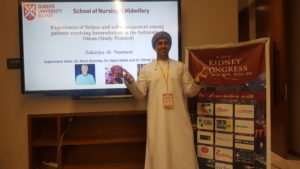Zakariya Al Naamani, PhD student, School of Nursing and Midwifery, Queen’s University Belfast.
Living with end-stage kidney disease (ESKD) and receiving haemodialysis treatment is a life challenging task. ESKD causes anaemia, electrolyte imbalances, uraemia and accumulation of waste products. Despite increased survival rates, patients who receive haemodialysis are required to adjust their life to maintain a difficult treatment regimen. This includes attending dialysis sessions three times a week for at least four hours each visit, in combination with adherence to strict fluid and dietary management, medications and recommended physical exercise. Patients receiving haemodialysis may experience debilitating physical, psychological, sexual and sociological symptoms that negatively impact on their daily activities. Forty-nine percent to 92% of the haemodialysis population experience fatigue with significant impact on daily activities (Picariello et al. 2018). Globally, there is a dearth of literature exploring patients’ experience and self-management of fatigue among this population (Horigan 2012), and most of these studies have been undertaken in western countries.
Below I present the experience of fatigue of a 43-year-old patient from Oman, who has received haemodialysis 3 times/week for almost 5 years. He is married with 4 children and working as a full-time employer in an oil company.
Fatigue changed my life tremendously especially in the first year of my haemodialysis journey. Fatigue is difficult to define or describe as its impact considerably touched almost all aspects of my life. Since I started the late pm (5-9) haemodialysis treatment shift, I feel exhausted especially after the session; therefore, I do not count that day part of my life. This is because once I arrive home at 10pm, my family wait for me in front of the main gate, my son helps me get out of the car and takes me upstairs to the bedroom and assists me to change my clothes and lay on the bed. I feel low energy and cannot even eat dinner with my family, I miss family gatherings and playing with my 5 years child. I feel that I am not a good father anymore as I feel guilty not being able to do even simple obligations as a father. Imagine I am rarely doing house chores or joining social activities and feel sorry my families struggle with me. I cannot sleep immediately because all my body is aching… My wife suffers a lot and I feel guilty for not being able to satisfy her sexually. My sexual relationship with her is less since I was diagnosed with ESKD as there is an erection problem. Fatigue adds extra burden to my sexual life as I experience less orgasms and sometimes cannot complete sexual intercourse as I am feeling exhausted and have no energy to finish it and feel both of us are not satisfied with our relations which sometimes causes emotional detachment. Next morning, I go to work, I used to work in the desert but due to my haemodialysis treatment I requested to be transferred to my city and work in an office instead the oil field. The company want to retire me medically as I cannot work in oil field anymore but thanks to God and my manager, I was helped to stay in work; otherwise, I will have financial crisis. Sometimes, I feel frustrated and uncomfortable among my work colleagues as some look at me with sympathy, and view me as a sick man who cannot perform his job. Sometimes I leave my work early because I feel very tired.
Oman is a Middle-East country. The culture, environment, religion and health service may play a role in how patients receiving haemodialysis experience and manage their fatigue. Research related to the experience of fatigue and self-management among patients receiving haemodialysis in Middle Eastern countries is required. Further study can assist the development of strategies to help manage fatigue for these patients that best suits their preferences, thereby improving patients’ daily activities and the quality of healthcare services in relation to assessment and management of fatigue.
References:
Horigan, A.E., 2012. Fatigue in hemodialysis patients: a review of current knowledge. Journal of Pain and Symptom Management, 44(5), pp.715–724. 10.1016/j.jpainsymman.2011.10.015.
Picariello, F. et al., 2018. Fatigue in Prevalent Haemodialysis Patients Predicts All-cause Mortality and Kidney Transplantation. Annals of Behavioral Medicine, pp.1–14. 10.1093/abm/kay061.
